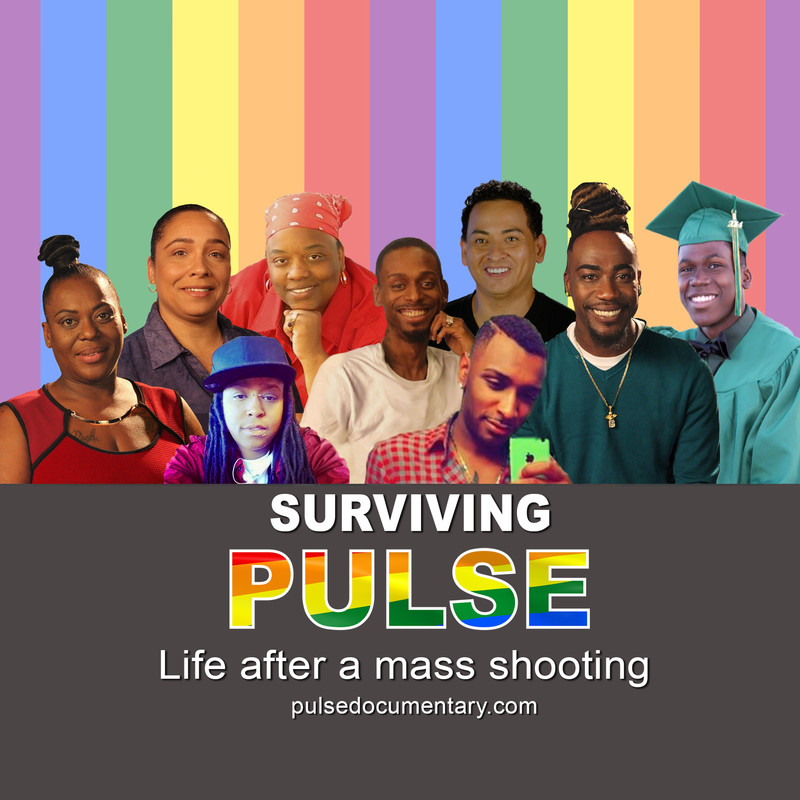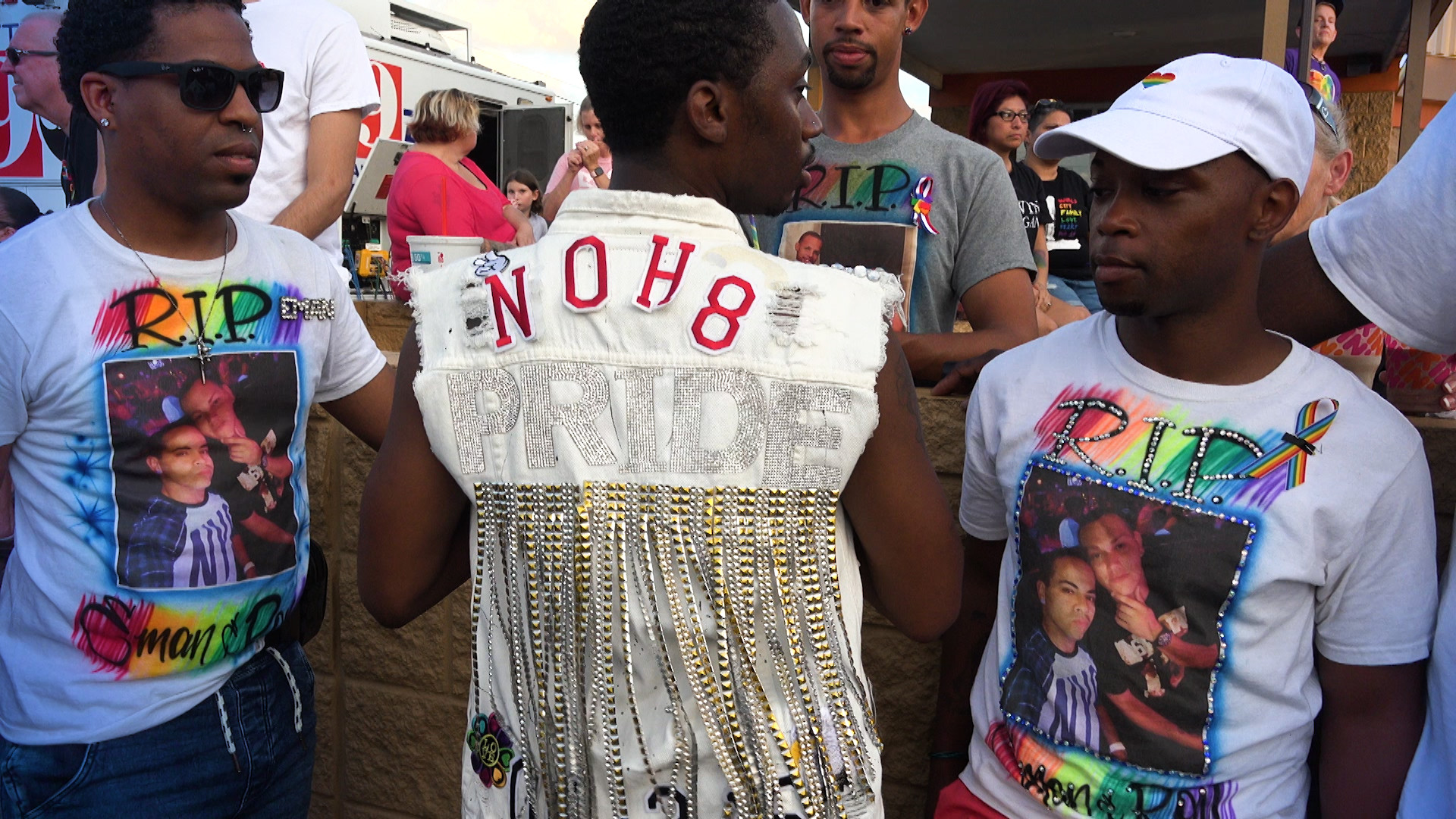By Will Espero
Surviving Pulse – Life After a Mass Shooting is a feature documentary from the United States directed by Alexa Sheehan. The Pulse nightclub was sponsoring Latino Night when a lone gunman entered the LGBTQ club and began shooting. By night’s end, 49 innocent victims were killed and the shooter was eventually shot dead by police. The stories, thoughts, and memories of the survivors are shared as the horrific events of that fateful evening are forever etched in their minds.
The film tells of a celebratory evening at an Orlando nightclub where people were free to be themselves, express their identities, and feel completely included and welcomed. The surprise attack and deaths to follow are detailed and explained as the disease of gun violence continues its toll in America.
The aftermath including PTSD, guilt, anxiety, fear, community dialogue, advocacy, and forgiveness shows the journeys many survivors are involved in or consumed with. The need for political representation and a champion for the LGBTQ constituency and community is highlighted indicative of the need to create a united front and voice.








Director Alexa Sheehan
Alexa Sheehan is a transplant to Florida after almost 20 years in Los Angeles working in the industry and its myriad media content. A member of the Director’s Guild of America, SAG-AFTRA, and a board member of both Women in Film and Television – Florida and Film Florida, she hopes to parlay her experience in Hollywood filmmaking to create and to bring big projects to Florida and shake up the industry there.
She and her husband, an Union Assistant Property Master, created HarborDashery Productions, a local production company in New Smyrna Beach, filming commercial and other media projects for local businesses and schools. She has been a judge in the Orlando 48 Hour Film Festival and Hub on Canal Student Film Festival, Alexa has sat on numerous panels to help educate the new regime of filmmakers, and to share stories of her experience.
This documentary began filming a year after the Pulse tragedy in 2016 which at the time was the largest LGBTQ-targeted mass shooting in United States history. As we interviewed the survivors over the months and years following, we found that the survivors of mass shootings have a very trauma-specific journey that needed to be shared. Sadly, the issue has become more prevalent in today’s society and its ripple effect on those that are collateral damage is real. These amazing people have endured, fought, and persevered telling their stories as exclusives. Hear their journeys of strength and hear the human side of the frenzy that often occurs after such an horrendous event. How it is portrayed in the media versus what happens in the lives of those involved, and what it is like to be left behind. We hope we have helped them be heard, and we are honored for them to allow us into their lives as an unconventional vehicle towards healing. They never asked to be survivors.
Alexa Sheehan
An interview by Daria Trifu:
On March 26, 2024, Daria Trifu had the pleasure to interview Aleesha Yates, a patron of Pulse Night Club and member of the local LGBTQ community, who was personally affected by the tragedy of the hateful act of violence that occurred on June 12, 2016.
How did you become involved, and what role did you play in the production of the documentary?
I am the silent, hidden secret who brought the story to Nancy Mcbride after I discovered that there were survivors who had not received any recognition or compensation. These victims were completely ignored and forgotten by the community, and they had no voice. I found it my duty to help my community tell their stories because the media completely ignored the fact that there was more than just the Latino community present that was affected by this tragedy.
Aleesha Yates describes how the idea of producing Surviving Pulse – Life After a Mass Shooting was born.
My role in the Surviving Pulse documentary was originally slated to be that of the on-screen narrator of the entire documentary, but it was decided by the producer that I would interview the cast off-camera to provide more focus on their individual stories. In my role, I crafted all the thought-provoking questions that brought this story to life. I interviewed the survivors, I assisted in the original casting process of the documentary, and I served as a bridge between the black LGBTQ community and the producer and director since they had no knowledge or access to the black LGBTQ community.
I am the bridge to this story that was able to mesh two completely different worlds together. I was there from the very beginning. This project is the result of my courage to reach out for help in order to help others. This entire story came from my heart to Nancy McBride’s ears and was brought to life by the talented Alexa Sheehan.
What motivated you to want to document the immediate aftermath and the journey to recovery of some of the survivors of this tragic event?
I was motivated to document the survivor’s stories because they deserved to be acknowledged and assisted. My concern was to get them financial assistance and the counseling that they needed.
I am a member of the black and Latino community, and I was a patron of Pulse Night Club and understood I too could have been a victim, but by chance and divine intervention, I did not make it to the club that night.
My goal was to help my community have a voice and let the world know they exist, that they are hurting, and that they did not receive the help that was promised and granted to many of the Orlando LGBTQ community. They were not included in the memorials or the national news media around the world. It was important for their stories to be told so that the world was aware that Pulse was for everyone and was never a Latin club; it just so happened that the massacre took place on a Latin night but people of many different races attended and lost their lives.
How was the documentary received locally, and by the members of the LGBTQ community and their families who were the most affected?
The documentary was well received by the community, and it really touched the hearts of many. A lot of people who were not part of the LGBTQ community were shocked and touched by the film. The LGBTQ community had mixed reactions because many of them were still traumatized by the tragedy. Most of them lost loved ones or were survivors of the tragedy, and thus, many could not mentally support the film. Everyone who has seen the documentary was touched by the heart-wrenching stories and felt compelled to ask how they could help the survivors.
It has been almost eight years since the devastating event. Has the local community been able to rebuild its strength and hope for a better, kinder, and safer future for all?
The Orlando LGBTQ community has never been the same and has never really recovered from the tragedy. Many of the survivors still have not received any counseling or financial support, so they are still suffering.
The Pulse mass shooting has mentally impacted all of us so heavily that most of us still live in fear. We have not recovered, and things will never be the same.
Our hope for a better, safer future is somehow nonexistent. We have been left broken and on edge, constantly on high alert. Though we all hope for a brighter future, we live in the constant harsh reality of facing our own mortality. We now know that at any time or place, our lives can be changed forever. We have learned to never feel safe anywhere and to hope for the best but prepare for the worst. The strength of our community lies in our will to live. We are still here, and we exist, and we can only hope to see the future.
Surviving Pulse – Life After a Mass Shooting had a very successful run on the festival circuit, and in 2022, it won the Best Feature Documentary award at the Global Nonviolent Film Festival. D!
Updated on March 26, 2024


Comments are closed.